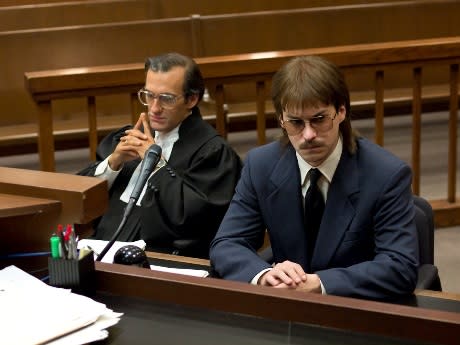Reiterating his auteur assertion of judicial fallibility and the corruption of innocence, French-Canadian director Daniel Grou (10 ½, 7 Days) tackles the true story of Michel Dumont with L'Affaire Dumont, detailing the court case and fallout experience of the grocery delivery man after he was wrongly convicted of sexual assault and sentenced to 52 months in a Cowansville prison. And while Grou doesn't completely shed his preoccupation with the molestation and abuse of children—having a peripheral storyline about the abuse of Dumont's son while he was in prison—he subdues his sensationalistic sensibilities for a grounded, more calculated and accessible, effort, adding mainstream potential.
Starting in the middle of things, this subdued and sensitive work gives a general idea of the pathetic nature of Michel's (Marc-Andre Grondin) quotidian experience, showing him climbing into his ramshackle car and pick up his kids from his low-class ex-wife in the middle of a miscarriage. He's quickly arrested inexplicably for sexual assault, which is where the court hearings—featuring verbatim dialogue from the actual trial—frame a story that jumps back and forth in time, showing what Dumont was doing on the night of the reported assault while detailing his experiences in prison.
Grounding it all and giving it some heart is his romance with the similarly jaded and downtrodden Solange (Marilyn Castonguay), a welfare recipient and mother-of-three that believes in Michel's innocence, clawing through the red tape of the Canadian justice system without any kind of assistance.
Because these socially marginalized lovers—and her dedication to a man with little future prospects and the inability to maintain an erection—are so meek and so damaged, but well-intentioned, there is an underdog aspect that helps with the potential discomfort of proving false testimony in a rape trial. Grou is careful not to construct a story that vilifies the victim or that suggests anything derogatory about those that lay charges on rapists, focusing instead on misguided legal tactics and courtroom screw-ups as overall antagonist.
As such, the portrait of Dumont as a diffident, down-on-his-luck fuck-up is a bit contrived and forced. But in essence, it's necessary to give the narrative some certainty, as the tone could have easily been mangled by audience doubt in his innocence.
Grou's lyrical, pseudo-expressionistic direction also elevates the text from the trappings of the biopic, focusing on the quiet human moments amidst the expository elements, making this more of a movie than heavy-handed didactic. This, along with the amusingly accurate costume and set design motifs from the early 1990s, give a lasting impression to a story that could easily fall into TV movie-of-the-week territory.
(eOne)Starting in the middle of things, this subdued and sensitive work gives a general idea of the pathetic nature of Michel's (Marc-Andre Grondin) quotidian experience, showing him climbing into his ramshackle car and pick up his kids from his low-class ex-wife in the middle of a miscarriage. He's quickly arrested inexplicably for sexual assault, which is where the court hearings—featuring verbatim dialogue from the actual trial—frame a story that jumps back and forth in time, showing what Dumont was doing on the night of the reported assault while detailing his experiences in prison.
Grounding it all and giving it some heart is his romance with the similarly jaded and downtrodden Solange (Marilyn Castonguay), a welfare recipient and mother-of-three that believes in Michel's innocence, clawing through the red tape of the Canadian justice system without any kind of assistance.
Because these socially marginalized lovers—and her dedication to a man with little future prospects and the inability to maintain an erection—are so meek and so damaged, but well-intentioned, there is an underdog aspect that helps with the potential discomfort of proving false testimony in a rape trial. Grou is careful not to construct a story that vilifies the victim or that suggests anything derogatory about those that lay charges on rapists, focusing instead on misguided legal tactics and courtroom screw-ups as overall antagonist.
As such, the portrait of Dumont as a diffident, down-on-his-luck fuck-up is a bit contrived and forced. But in essence, it's necessary to give the narrative some certainty, as the tone could have easily been mangled by audience doubt in his innocence.
Grou's lyrical, pseudo-expressionistic direction also elevates the text from the trappings of the biopic, focusing on the quiet human moments amidst the expository elements, making this more of a movie than heavy-handed didactic. This, along with the amusingly accurate costume and set design motifs from the early 1990s, give a lasting impression to a story that could easily fall into TV movie-of-the-week territory.
